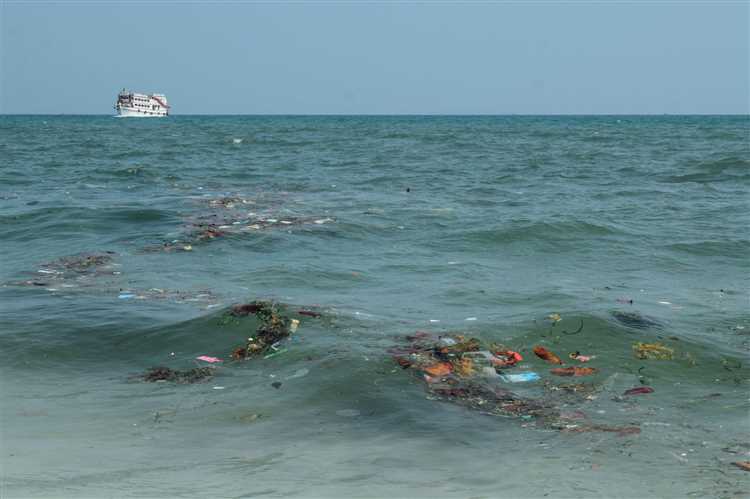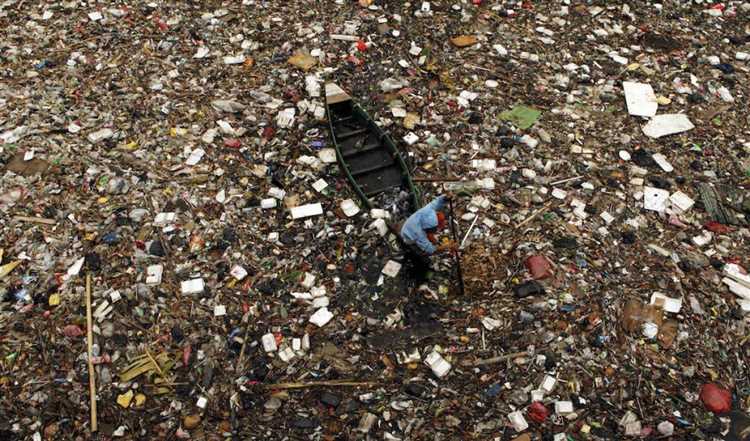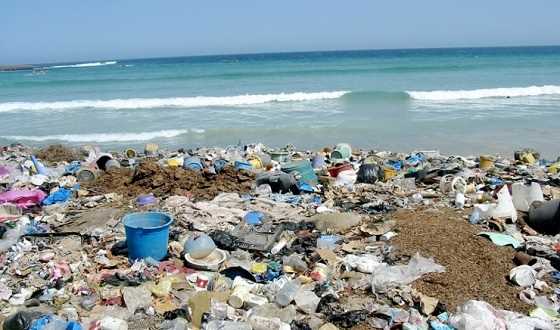
Ocean dumping is a growing environmental concern, and many are pointing their fingers at China as being one of the major culprits. With its booming population and rapid industrialization, China has become the world’s largest producer of marine debris. The country’s economic growth has come at a high cost, with its rivers and coastlines bearing the brunt of the pollution.
China’s coastal cities are known for their heavy industrial activity and lack of proper waste management systems. As a result, large quantities of waste, including plastics, chemicals, and other toxic substances, find their way into the ocean. This has devastating consequences for marine life and poses a threat to the overall health of the marine ecosystem.
One of the main factors contributing to China’s contribution to ocean dumping is its reliance on disposable plastic products. With a consumer culture that emphasizes convenience and quick disposal, China has seen a dramatic increase in plastic waste. Despite efforts to implement recycling programs, the infrastructure and awareness needed to effectively manage plastic waste are still lacking in many areas.
- China’s Role in Ocean Dumping
- Inadequate Waste Management Practices
- Promoting Sustainable Practices
- The Scale of Ocean Dumping
- Environmental Impact of Ocean Dumping
- Marine Debris and Plastic Pollution
- Global Impact
- China’s Contribution to Ocean Dumping
- International Regulations and China’s Compliance
- The Basel Convention
- The London Convention
- Efforts to Reduce Ocean Dumping
- The Role of Other Countries
- Q&A
- Is China the biggest contributor to ocean dumping?
- How does ocean dumping affect marine life?
- What measures has China taken to address ocean dumping?
- Are there any international regulations against ocean dumping?
- What can individuals do to help reduce ocean dumping?
China’s Role in Ocean Dumping
China, as the world’s largest exporter and manufacturer, plays a significant role in ocean dumping. The country’s rapid industrialization and economic growth have resulted in massive amounts of waste being dumped into the ocean, causing severe environmental consequences.
One of the main reasons for China’s contribution to ocean dumping is its lax environmental regulations and enforcement. Many factories and industries in China prioritize profits over ecological sustainability, leading to the improper disposal of waste materials.
Inadequate Waste Management Practices
China’s inadequate waste management practices exacerbate the problem of ocean dumping. Improper waste disposal methods, such as open burning, illegal dumping, and unregulated landfill operations, further contribute to pollution in both the land and marine environments.
Additionally, the lack of proper waste collection infrastructure and recycling facilities in many parts of China makes it easier for waste to end up in rivers and eventually flow into the ocean. Inadequate waste management systems not only harm the environment but also pose health risks to local communities.
Promoting Sustainable Practices

Despite its significant role in ocean dumping, China has started to take steps towards promoting sustainable practices and reducing waste. The country has implemented stricter environmental regulations and increased penalties for illegal dumping.
Furthermore, China has initiated campaigns to raise awareness among its citizens about the importance of waste reduction, recycling, and responsible waste management. The government has encouraged the development of recycling industries and the use of advanced technologies to minimize waste generation.
In conclusion, China’s role in ocean dumping cannot be ignored. The country’s lax environmental regulations and inadequate waste management practices have contributed to the problem. However, China has also started taking action to address these issues and promote sustainable practices, indicating the potential for positive change in the future.
The Scale of Ocean Dumping
Ocean dumping is a global environmental issue that affects the health and well-being of our planet’s oceans. While multiple countries contribute to the problem, China’s role in ocean dumping is significant due to its vast population and industrial activities.
Population Pressure
China is the most populous country in the world, with over 1.4 billion people. The sheer number of individuals creates a massive demand for resources and generates an immense amount of waste. As a result, the disposal of waste becomes a significant challenge, and often, the easiest solution is to dump it into the ocean.
Industrialization and Manufacturing
China has experienced rapid industrialization and manufacturing growth over the past few decades. This growth has resulted in increased production of goods and, consequently, the generation of large quantities of waste materials. Inefficiencies in waste management systems and inadequate regulations have led to the disposal of industrial waste directly into the ocean.
Illegal Dumping
China has also struggled with illegal activities, including the illegal dumping of waste materials into the ocean. Despite efforts by the Chinese government to crack down on such practices, the sheer scale of the problem makes it challenging to eradicate completely. Illegal dumping not only harms the marine ecosystem but also affects the livelihoods of coastal communities.
International Impact
While China may contribute significantly to ocean dumping, it is important to note that this is a global issue that requires collective action. The pollution caused by ocean dumping does not respect national boundaries and can have far-reaching consequences. It is crucial for countries to work together to develop and enforce strict regulations to prevent further contamination of the oceans.
In conclusion, while China’s role in ocean dumping is substantial, it is part of a larger problem that requires a global solution. Efforts to reduce ocean pollution must involve not only China but also other nations, international organizations, and individuals working together to protect our precious oceans.
Environmental Impact of Ocean Dumping
Ocean dumping is a practice that involves the disposal of waste materials into the sea. While it may be a convenient and cost-effective method of waste management, it has significant environmental impacts that need to be considered.
One of the major concerns with ocean dumping is that it can lead to the pollution of marine ecosystems. The waste materials dumped into the ocean can contain various chemicals and toxins that can disrupt the natural balance of marine life. These pollutants can be harmful to fish, shellfish, and other marine organisms, which can have a cascading effect on the entire ecosystem.
In addition to the direct harm caused by the pollutants themselves, ocean dumping can also result in physical damage to marine habitats. Dumped materials can smother and destroy coral reefs, seagrass beds, and other important habitats for marine life. This destruction can have long-lasting effects on the biodiversity and overall health of the affected areas.
Marine Debris and Plastic Pollution

One of the most significant environmental impacts of ocean dumping is the contribution to marine debris and plastic pollution. Plastics and other non-biodegradable materials that are dumped into the ocean can persist for years or even centuries, slowly breaking down into smaller and smaller pieces called microplastics.
These microplastics can be ingested by marine organisms, causing physical harm and potentially entering the food chain. This has implications not only for marine life but also for human health, as microplastics have been found in seafood consumed by humans.
Global Impact
Ocean dumping is a global issue that affects not only the countries directly responsible for the dumping but also the entire world. Ocean currents can transport dumped materials across vast distances, leading to pollution in areas far from the original source.
The environmental impact of ocean dumping extends beyond the immediate pollution and physical damage to marine ecosystems. It disrupts the natural balance of our planet’s delicate ecosystems, affecting everything from biodiversity to climate patterns.
Therefore, it is crucial for governments and organizations around the world to address the issue of ocean dumping and find alternative, more sustainable methods of waste management.
China’s Contribution to Ocean Dumping
China has a significant impact on the issue of ocean dumping due to its rapid economic growth and large population. As the world’s largest exporter and second-largest economy, China’s industrial activities and consumer demands result in a substantial amount of waste being generated.
The country’s manufacturing sector, which produces a wide range of products for export, generates massive quantities of waste materials and byproducts. These include chemicals, heavy metals, plastics, and other harmful substances that can end up in the ocean if not properly managed.
Furthermore, China’s urbanization and population growth result in increased consumption and waste generation. As more people move to cities and adopt a modern lifestyle, there is a surge in plastic usage, electronic waste, and other single-use products. Improper disposal and inadequate waste management systems contribute to the problem of ocean dumping.
It is important to note that China has taken steps to address this issue. The country has implemented stricter regulations on waste management and has banned the importation of certain types of solid waste. Additionally, China has made efforts to promote recycling and reduce plastic usage through public awareness campaigns and initiatives.
However, despite these efforts, the sheer scale of China’s waste generation and the challenges in enforcing regulations make it difficult to completely eliminate its contribution to ocean dumping. International cooperation and increased awareness are necessary to tackle this global issue effectively.
In conclusion, while China is not solely responsible for ocean dumping, its industrial activities, consumer demands, and waste generation have a significant impact on the problem. Addressing the issue requires a collaborative effort by governments, industries, and individuals to reduce waste, improve waste management systems, and promote sustainable practices.
International Regulations and China’s Compliance
International regulations play a significant role in governing ocean dumping practices and are designed to prevent environmental damage and protect marine ecosystems. Various agreements and conventions have been established to address the issue of ocean dumping, and countries around the world are expected to comply with these regulations.
The Basel Convention
The Basel Convention, a global treaty that came into effect in 1992, aims to control the transboundary movement and disposal of hazardous wastes. China is a signatory to this convention and has committed to regulating the export and import of hazardous wastes to ensure their environmentally sound management.
The London Convention
The London Convention, established in 1972, prohibits the dumping of certain wastes, including radioactive waste and chemical weapons, into the ocean. China is a party to this convention and is required to prevent the dumping of such wastes within its jurisdiction.
While China has ratified these international agreements, concerns have been raised about its compliance with the regulations. Reports have highlighted instances where Chinese vessels have been accused of illegally dumping waste in international waters. Despite these reports, it is important to note that not all instances of ocean dumping can be directly attributed to China.
It is crucial for the international community to continue monitoring and enforcing compliance with these regulations to prevent further ocean dumping. Collaboration and information sharing between countries can help identify and address any instances of non-compliance, ensuring that all nations are held accountable for their actions to protect our oceans.
Efforts to Reduce Ocean Dumping
Addressing the issue of ocean dumping requires a collaborative effort from nations around the world. Many countries have taken steps to reduce and prevent ocean dumping, including China. Here are some of the notable efforts made to combat this environmental problem:
| Effort | Description |
|---|---|
| International Agreements | China, along with other countries, has participated in international agreements like the London Convention and the Oslo-Paris Convention. These conventions aim to regulate the dumping of wastes and other harmful substances into the ocean, promoting responsible disposal practices. |
| Legislation and Regulations | China has implemented laws and regulations to govern waste management and prevent ocean dumping. The Marine Environmental Protection Law of China establishes penalties for individuals and organizations found guilty of violating waste disposal regulations. |
| Monitoring and Enforcement | China has taken steps to improve monitoring and enforcement of waste management practices. Increased surveillance and inspections of waste treatment facilities help ensure compliance with regulations and prevent illegal dumping activities. |
| Public Awareness and Education | Efforts have been made to raise public awareness about the impact of ocean dumping. China has implemented educational campaigns and initiatives to inform the public about the importance of proper waste disposal and the preservation of marine ecosystems. |
| Technology and Innovation | China has invested in technological advancements and innovative solutions to address the issue of ocean dumping. Improved waste management systems, such as advanced recycling facilities and waste-to-energy conversion technologies, are being developed and implemented to minimize waste production and promote sustainable practices. |
While progress has been made, there is still much work to be done to effectively reduce and ultimately eliminate ocean dumping. Continued international cooperation and the implementation of stricter regulations are necessary to protect our oceans and ensure the long-term health of marine ecosystems.
The Role of Other Countries
While China has been a prominent player in ocean dumping, it is important to recognize that other countries also contribute to this issue. One of the significant contributors is the United States, which is one of the largest generators of plastic waste globally. While the US has implemented recycling programs and has regulations in place regarding waste disposal, a substantial amount of plastic waste still ends up in the ocean.
Another country that plays a role in ocean dumping is Indonesia. Due to its growing population and limited waste management infrastructure, Indonesia struggles with disposing of its waste properly. As a result, a significant amount of plastic waste from Indonesia finds its way into rivers, which eventually leads to the ocean.
Moreover, Brazil is also a significant contributor to ocean dumping. In recent years, Brazil has seen a rapid increase in plastic production and consumption. However, the country lacks efficient waste management systems, resulting in plastic waste being disposed of improperly and polluting rivers and ultimately the ocean.
Furthermore, India is another country that contributes to ocean dumping. With its large population and inadequate waste management infrastructure, India faces challenges in managing its waste effectively. Plastics are often discarded in rivers and other water bodies, leading to the contamination of the oceans.
It is critical for all countries to take responsibility and address their contribution to ocean dumping. This includes implementing better waste management systems, promoting recycling and reducing single-use plastics, and raising awareness about the environmental consequences of plastic pollution. Collaboration between countries is also necessary to combat this global issue effectively.
Q&A
Is China the biggest contributor to ocean dumping?
Yes, China is currently the biggest contributor to ocean dumping. The country produces a significant amount of plastic waste and has a high population density, which leads to a large amount of waste being generated.
How does ocean dumping affect marine life?
Ocean dumping has a negative impact on marine life. The waste and debris dumped into the ocean can entangle, suffocate, and injure marine animals. It can also contaminate their habitats and disrupt their food chains, leading to a decline in biodiversity.
What measures has China taken to address ocean dumping?
China has taken some measures to address ocean dumping. The country has implemented regulations to reduce plastic waste and improve waste management practices. It has also joined international agreements and initiatives aimed at reducing marine pollution.
Are there any international regulations against ocean dumping?
Yes, there are international regulations against ocean dumping. The London Convention and its Protocol regulate the dumping of waste and other materials into the ocean. These agreements aim to prevent marine pollution and protect the marine environment.
What can individuals do to help reduce ocean dumping?
Individuals can contribute to reducing ocean dumping by practicing responsible waste management. This includes properly disposing of trash, recycling materials, and reducing the use of single-use plastics. Supporting organizations and initiatives that work towards preventing marine pollution is also important.
